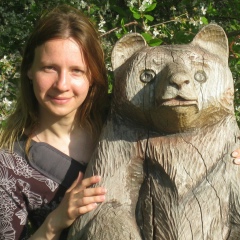Во втором отделении сегодня был Реквием Моцарта. Я по-новому открыл его. Если раньше в 20х летнем возрасте я баловался и воспринимал те серьезные, как гром, жёсткие ноты - как подобие рока, и мне наоборот нравился этот жёсткий ритм... То теперь я по-новому воспринял. Вообще же Реквием основан на религиозных текстах, но если убрать религию, то вот какая экзистенциальная картина получается.
Первые ноты похожи на раскаты грома, которые как приговор извещают о смерти. О неизбежном, о том, что смерть вмещается в ход твоей жизни, воли. Это звучание подавляет всё, желание жить, волю, страх и ужас затмевает тебя всего...
Следующая часть динамичная... Но это динамика суеты, когда человек парализован, ему не за что хвататься, когда у него нет сил, когда он не успевает за ходом жизни. А она отсчитывает часы.
Далее следует накопление и выплескивание протеста, несогласия со смертью. Беспомощные.
Я начинаю теряться... Время, которое только что бежало молниеносно, останавливается. Становится невыносимо тоскливо от того, что ты вне времени. И конец, известный тебе, не приходит.
За одной частью к другой следуют разные мысли. О любви к миру. Тревога о воспоминаниях того, что хотел, но что не успел.
Легендарная Лакримоза. Это плач, начинающийся тихо, и переходящий в рыдание и сопротивление воли ходу завершения жизни... (Впрочем, каждый услышет своё) Человек собирает воедино всё то, чем он жил, верил в любовь, в людей, в свою правоту. И понимает, что перед лицом смерти его карты не играют. Человек открывает всю колоду того, чем дорожил и упорно требует к себе уважения и чувства достоинства, что жил он не зря, что это будет жить после него. Что карты эти не теряют смысла, пока есть он - Человек.
Далее следуют, по-видимому, религиозные диалоги солистов. Долгие, тяжелые. Попытка отвлечься от тяжелого конца... Эта часть затянута, но это неизбежно. От неё устаешь, и хочется уже финала.
Так вот под конец идёт повторение. Снова гром объявляет о конце, снова начинается суета, воронка неизбежности... Но звучит и воспринимается это уже по-другому после грандиозного развития. И на этом Реквием заканчивается.
Мне нравится такой финал.
После всех экзистенциальных переживаний, утверждения своей силы над смертью (подобно Андрею Балконскому на войне и Пьеру Безухову перед расстрелом французов) - утверждается сила воли и готовность к смерти. Это не смирение и не плевок в лицо. Это уважение, сформулированное как нигде ещё в произведениях - многогранно. Она уже не так страшна, она не подавила волю и любовь к жизни, к миру. Это утверждение любви и жизни.
Реквием не для ушедших. Он для живых. Чтобы мы воспитали свою волю, чтобы "не было мучительно больно".
Реквием очень тяжёлое произведение. Метафизический, нравственный. Он приближает нас к той страшной грани, где заканчивается наше бытие. Это как обрыв, о котором надо знать.
Религиозный аспект, скорее всего, тоже имеется. И христиане, наверное, поймут что-то другое. Но я склонен воспринимать искусство самостоятельно, вне мифологического контекста.
А я очередной раз понял, что немецкая философия/австрийская музыка как никогда актуальны, а многие идеи в современной культуре - лишь их повторение.
Первые ноты похожи на раскаты грома, которые как приговор извещают о смерти. О неизбежном, о том, что смерть вмещается в ход твоей жизни, воли. Это звучание подавляет всё, желание жить, волю, страх и ужас затмевает тебя всего...
Следующая часть динамичная... Но это динамика суеты, когда человек парализован, ему не за что хвататься, когда у него нет сил, когда он не успевает за ходом жизни. А она отсчитывает часы.
Далее следует накопление и выплескивание протеста, несогласия со смертью. Беспомощные.
Я начинаю теряться... Время, которое только что бежало молниеносно, останавливается. Становится невыносимо тоскливо от того, что ты вне времени. И конец, известный тебе, не приходит.
За одной частью к другой следуют разные мысли. О любви к миру. Тревога о воспоминаниях того, что хотел, но что не успел.
Легендарная Лакримоза. Это плач, начинающийся тихо, и переходящий в рыдание и сопротивление воли ходу завершения жизни... (Впрочем, каждый услышет своё) Человек собирает воедино всё то, чем он жил, верил в любовь, в людей, в свою правоту. И понимает, что перед лицом смерти его карты не играют. Человек открывает всю колоду того, чем дорожил и упорно требует к себе уважения и чувства достоинства, что жил он не зря, что это будет жить после него. Что карты эти не теряют смысла, пока есть он - Человек.
Далее следуют, по-видимому, религиозные диалоги солистов. Долгие, тяжелые. Попытка отвлечься от тяжелого конца... Эта часть затянута, но это неизбежно. От неё устаешь, и хочется уже финала.
Так вот под конец идёт повторение. Снова гром объявляет о конце, снова начинается суета, воронка неизбежности... Но звучит и воспринимается это уже по-другому после грандиозного развития. И на этом Реквием заканчивается.
Мне нравится такой финал.
После всех экзистенциальных переживаний, утверждения своей силы над смертью (подобно Андрею Балконскому на войне и Пьеру Безухову перед расстрелом французов) - утверждается сила воли и готовность к смерти. Это не смирение и не плевок в лицо. Это уважение, сформулированное как нигде ещё в произведениях - многогранно. Она уже не так страшна, она не подавила волю и любовь к жизни, к миру. Это утверждение любви и жизни.
Реквием не для ушедших. Он для живых. Чтобы мы воспитали свою волю, чтобы "не было мучительно больно".
Реквием очень тяжёлое произведение. Метафизический, нравственный. Он приближает нас к той страшной грани, где заканчивается наше бытие. Это как обрыв, о котором надо знать.
Религиозный аспект, скорее всего, тоже имеется. И христиане, наверное, поймут что-то другое. Но я склонен воспринимать искусство самостоятельно, вне мифологического контекста.
А я очередной раз понял, что немецкая философия/австрийская музыка как никогда актуальны, а многие идеи в современной культуре - лишь их повторение.
In the second part today was the Requiem of Mozart. I re-opened it. If earlier, at the age of 20, I indulged and took those serious, like thunder, hard notes - like a kind of rock, and I, on the contrary, liked this hard rhythm ... Now I perceived in a new way. In general, the Requiem is based on religious texts, but if you remove religion, then what an existential picture is obtained.
The first notes are similar to the rumble of thunder, which, as a verdict, announce death. About the inevitable, that death fits in the course of your life, will. This sound suppresses everything, the desire to live, will, fear and horror overshadows you all ...
The next part is dynamic ... But this is the dynamic of fuss, when a person is paralyzed, he has nothing to clutch at, when he has no strength, when he does not keep up with the course of life. And she counts the clock.
This is followed by the accumulation and outburst of protest, disagreement with death. Helpless
I'm starting to get lost ... The time that just ran at lightning speed stops. It becomes unbearably depressing that you are timeless. And the end known to you does not come.
For one part to another followed by different thoughts. About the love of the world. Anxiety about the memories of what he wanted, but that did not have time.
Legendary Lacrimosa. It is a crying, starting quietly, turning into sobbing and resistance of the will to the end of life ... (However, everyone will hear his own) A person gathers together everything that he lived, believed in love, in people, in his own right. And he understands that in the face of death, his cards do not play. A person opens the whole deck of what he valued and stubbornly demands respect and a sense of dignity for himself, that he lived for a reason, that it will live after him. That these cards do not lose their meaning, while he is - Man.
This is followed, apparently, by the religious dialogues of the soloists. Long, heavy. Attempt to distract from the hard end ... This part is tightened, but it is inevitable. You get tired of it, and you already want the final.
So at the end there is a repetition. Again the thunder announces the end, vanity begins again, the funnel of inevitability ... But it sounds and is perceived in a different way after a grand development. And this Requiem ends.
I like this ending.
After all the existential experiences, the assertion of his power over death (like Andrei Balkonsky in the war and Pierre Bezuhov before the French were shot) - will power and readiness for death are asserted. This is not humility and not spitting in the face. This respect, formulated as nowhere else in the works, is multifaceted. She is no longer so terrible, she did not suppress the will and love of life, of the world. This is a statement of love and life.
Requiem is not for the departed. He is for the living. So that we bring up our will, so that "it would not be excruciatingly painful."
Requiem is a very hard work. Metaphysical, moral. He brings us closer to that horrible face where our being ends. It is like a cliff to be aware of.
Religious aspect, most likely, also exists. And Christians will probably understand something else. But I am inclined to perceive art on my own, outside the mythological context.
And I once again realized that German philosophy / Austrian music is more relevant than ever, and many ideas in modern culture are just their repetition.
The first notes are similar to the rumble of thunder, which, as a verdict, announce death. About the inevitable, that death fits in the course of your life, will. This sound suppresses everything, the desire to live, will, fear and horror overshadows you all ...
The next part is dynamic ... But this is the dynamic of fuss, when a person is paralyzed, he has nothing to clutch at, when he has no strength, when he does not keep up with the course of life. And she counts the clock.
This is followed by the accumulation and outburst of protest, disagreement with death. Helpless
I'm starting to get lost ... The time that just ran at lightning speed stops. It becomes unbearably depressing that you are timeless. And the end known to you does not come.
For one part to another followed by different thoughts. About the love of the world. Anxiety about the memories of what he wanted, but that did not have time.
Legendary Lacrimosa. It is a crying, starting quietly, turning into sobbing and resistance of the will to the end of life ... (However, everyone will hear his own) A person gathers together everything that he lived, believed in love, in people, in his own right. And he understands that in the face of death, his cards do not play. A person opens the whole deck of what he valued and stubbornly demands respect and a sense of dignity for himself, that he lived for a reason, that it will live after him. That these cards do not lose their meaning, while he is - Man.
This is followed, apparently, by the religious dialogues of the soloists. Long, heavy. Attempt to distract from the hard end ... This part is tightened, but it is inevitable. You get tired of it, and you already want the final.
So at the end there is a repetition. Again the thunder announces the end, vanity begins again, the funnel of inevitability ... But it sounds and is perceived in a different way after a grand development. And this Requiem ends.
I like this ending.
After all the existential experiences, the assertion of his power over death (like Andrei Balkonsky in the war and Pierre Bezuhov before the French were shot) - will power and readiness for death are asserted. This is not humility and not spitting in the face. This respect, formulated as nowhere else in the works, is multifaceted. She is no longer so terrible, she did not suppress the will and love of life, of the world. This is a statement of love and life.
Requiem is not for the departed. He is for the living. So that we bring up our will, so that "it would not be excruciatingly painful."
Requiem is a very hard work. Metaphysical, moral. He brings us closer to that horrible face where our being ends. It is like a cliff to be aware of.
Religious aspect, most likely, also exists. And Christians will probably understand something else. But I am inclined to perceive art on my own, outside the mythological context.
And I once again realized that German philosophy / Austrian music is more relevant than ever, and many ideas in modern culture are just their repetition.
У записи 11 лайков,
0 репостов.
0 репостов.
Эту запись оставил(а) на своей стене Михаил Карпенко
































